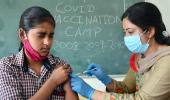A new strain of the COVID-19 Omicron variant, first detected in the UK, appears to be more transmissible than previous strains of the coronavirus, the WHO has said, asserting that COVID-19 remains a public health emergency of international concern and warning that it is 'too early' to reduce the quality of surveillance.

The World Health Organisation said in its latest update that the XE recombinant (BA.1-BA.2) was first detected in the UK on January 19 and more than 600 sequences have been reported and confirmed since then.
"Early-day estimates indicate a community growth rate advantage of 10 per cent as compared to BA.2. However, this finding requires further confirmation," it said.
The Geneva-based UN health agency said that XE belongs to the Omicron variant until significant differences in transmission and disease characteristics, including severity, may be reported.
"WHO continues to closely monitor and assess the public health risk associated with recombinant variants, alongside other SARS-CoV-2 variants, and will provide updates as further evidence becomes available," it said.
The COVID19 Weekly Epidemiological Update, released on Wednesday, had said that deaths from COVID-19 last week increased by 43 per cent, driven by factors including retrospective adjustments reported from India in the South-East Asia Region.
Between the end of January and early March 2022, there was a decreasing trend in the number of new COVID-19 cases, which was followed by two consecutive weeks of increases in cases, the WHO said.
During the week of March 21 to 27 this year, the number of new cases declined again with a 14 per cent decrease as compared with the previous week.
"On the other hand, during the same period, the number of new weekly deaths increased by 43 per cent, likely driven by changes in the definition of COVID-19 deaths in some countries in the Region of the Americas (Chile and the United States of America) and by retrospective adjustments reported from India in the South-East Asia Region," the update said.
Across the six WHO regions, over 10 million new cases and over 45,000 fresh deaths were reported.
All regions reported decreasing trends in the number of new weekly cases and four regions reported a decreasing trend in new weekly deaths. As of March 27, over 479 million confirmed cases and over 6 million deaths have been reported globally.
The update said that at the country level, the highest number of new weekly cases were reported from South Korea (2,442,195 new cases; -13 per cent), Germany (1,576,261 new cases; +2 per cent), Vietnam (1,127,716 new cases; -40 per cent), France (845,119 new cases; +45 per cent), and Italy (503,932 new cases; +6 per cent).
The highest number of new weekly deaths were reported from Chile (11,858 new deaths; +1710 per cent), the United States of America (5,367 new deaths; +83 per cent), India (4,525 new deaths; +619 per cent), Russia (2,859 new deaths; -22 per cent), and South Korea (2,471 new deaths; +22 per cent).
The South-East Asia Region reported over 232,000 new weekly cases, a 14 per cent decline as compared with the previous week, continuing the decreasing trend observed since mid-January 2022.
However, Sri Lanka reported an increase in new weekly cases of 25 per cent (2693 vs 2156 new cases).
The highest numbers of new cases were reported from Thailand (175,116 new cases; +4 per cent increase), Indonesia (36,470 new cases; -49 per cent), and India (11,612 new cases; -31 per cent).
The region reported just over 6000 new weekly deaths, representing a 116 per cent increase as compared to the previous week. The highest numbers of new deaths were reported from India (4525 new deaths; +619 per cent) due to retrospective adjustments in some states, followed by Indonesia (932 new deaths; -41 per cent), and Thailand (553 new deaths; +3 per cent).
The WHO said it is concerned over the recent significant reduction in SARS-CoV-2 testing by several Member States.
Data are becoming progressively less representative, less timely, and less robust.
"This inhibits our collective ability to track where the virus is, how it is spreading and how it is evolving: information and analyses that remain critical to effectively end the acute phase of the pandemic," it said.
Decreases in testing, unless done judiciously as part of a strategy aimed at maintaining robust surveillance where it is most impactful, may affect the capacity of countries to identify cases and enable their timely treatment or isolation, and implement other necessary control measures, with the consequent risk of increased spread of SARS-CoV-2, it said.
"This may translate in an increase in hospitalisations and deaths, and significant strains on healthcare systems, particularly in areas where public health and social measures have been lifted and where vaccination coverage against COVID-19 is low. Furthermore, reduced testing impacts the capacity of countries to detect emerging variants early, ultimately impairing response efforts," it said.
The UN agency said COVID-19 remains a public health emergency of international concern, asserting that it is "too early" to reduce the quality of surveillance.
"The uncertainty around the characteristics of emerging variants limits our ability to confidently predict the behaviour of this disease, as the evolution rate and risk of emerging variants are still high, which could undermine prevention and mitigation measures.
"Until we reach the end of the acute phase of the pandemic, countries must maintain sufficient epidemiologic surveillance to inform evidence-based operational decision-making on crucial parameters, including vaccination strategies, vaccine composition, use of therapeutics, and tailored and appropriate public health and social measures," it said.











 © 2025
© 2025